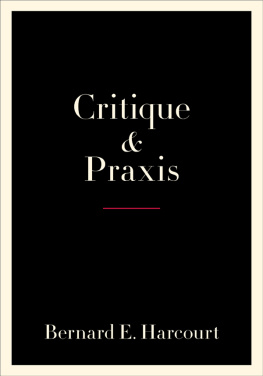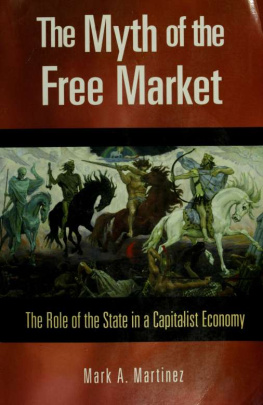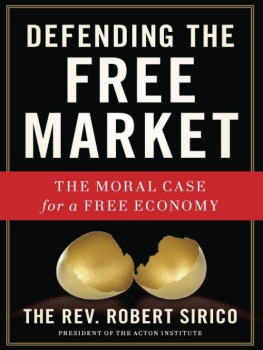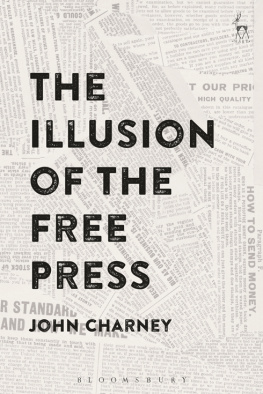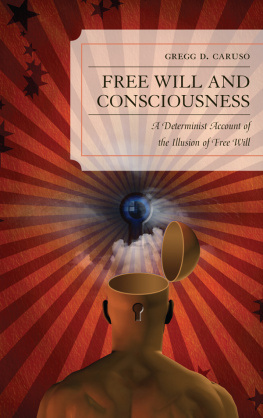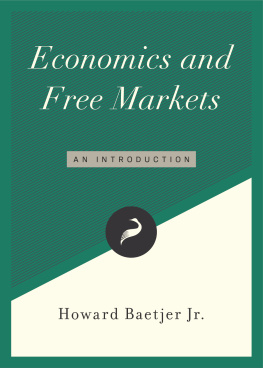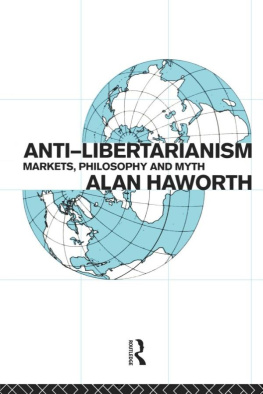
PUNISHMENT AND THE MYTH OF NATURAL ORDER
Bernard E. Harcourt
The Illusion of Free Markets
The Illusion of Free Markets
Punishment and the Myth of Natural Order
Bernard E. Harcourt
Harvard University Press
Cambridge, Massachusetts, and London, England
Copyright 2011 by the President and Fellows of Harvard College All rights reserved
Printed in the United States of America
Library of Congress Cataloging-in-Publication Data
Harcourt, Bernard E., 1963-
The illusion of free markets : punishment and the myth of natural order / Bernard E. Harcourt. p. cm.
Includes bibliographical references and index.
ISBN 978-0-674-05726-5 (alk. paper)
1. PunishmentUnited States. 2. Free enterpriseUnited States.
3. Chicago school of economics. 4. Chicago Board of Trade. I. Title.
HV9950.H393 2011 330.1553dc22 2010027060
To my colleagues
Gary Becker, Ronald Coase,
Richard Epstein, and Richard Posner
Contents
The Paris Marais and the Chicago Board of Trade
Beccaria on Crime and Punishment
Policing the Public Economy
The Birth of Natural Order
The Rise of Legal Despotism
Benthams Strange Alchemy
The Chicago School
The Myth of Discipline
The Illusion of Freedom
The Penitentiary System and Mass Incarceration
Private Prisons, Drugs, and the Welfare State
A Prolegomenon
Notes Bibliography Acknowledgments Index
The Paris Marais and the Chicago Board of Trade
Commissioner Emmanuel Nicolas Parisot was conducting his rounds in the Saint-Paul market in the Marais in Paris. It was early May 1739. As the investigator, examiner, and royal counselor responsible for the Saint-Antoine district, Parisot reported to Rene Herault, lieutenant general de police at the Chatelet of Paris, the royal palace of justice. Parisot was going from baker to baker, weighing their bread, when he discovered at Jean Thyous stand four three-pound breads each light one-and-a-half ounces.1 At about the same time, Commissioner Charles, also doing his market rounds, discovered at Courtoiss bakery on rue de Chantre one bread labeled eight pounds in weight, light two ounces, two others marked the same weight one ounce light each, six labeled four pounds in weight each one ounce off, another six pound bread light one ounce and a half, two others labeled six pounds in weight, eight others marked four pounds in weight, all a half ounce light.2 Another commissioner, Delespinay, found a cache of underweight breads in a small room hidden in the back of Aublays bakery shop on the vieille rue du Temple. Delespinay immediately seized the bread and had it sent to the Sisters of the Charity of the Saint-Gervais parish.3 (Commissioner Charles had sent his confiscated bread to the Capuchin friars on the rue Saint Honore and to the poor at the parish of Saint-Germain lAuxerrois.4) When the lieutenant de police held court the following May 5,1739, Herault condemned the bakers but showed mercy and, this time only, sentenced each to only fifty livres in fines.5
Later the same month, on May 29, master baker Amand, an elected syndic in charge of his community of master bakers, found himself accused of selling a loaf of bread in his shopspecifically, one white bread weighing four pounds, at eleven solsat a higher price than marketto be exact, three deniers for each pound above the common market price.6 Herault declared Amand guilty, fined him three hundred livres, and stripped him of his elected office. In the sentencing order, Herault ordered the other syndics to assemble within three days of the publication of his sentence and to proceed in their office to the election of a new syndic.7 A week earlier, Herault had convicted Marie-Hebert Heguin of buying grain at market for resale and fined her a thousand livres.8 A royal ordinance prohibited buying grain with the intention of reselling it: It is permitted to purchase grain at market for ones use; however, it is not permitted to buy grain for resale: the reason, very simply, is that he who buys for purposes of resale must necessarily gain from the transaction and, as a result, will sell it at a higher price than market rate, which constitutes a punishable monopoly.9
It is in these terms that M. Edme de la Poix de Freminville described the Parisian grain markets in his 1758 Dictionnaire ou traite de la police generale, in which he collected, assembled, organized, classified, reported, and reprinted a myriad of these sentences and royal ordinances. A manual of policing, a compendium of disciplinary practices, Freminvilles dictionary codified alphabetically a gamut of rules and prescriptions covering not only subsistencegrains, bread, meats, fish, poultry, oysters, and legumesbut also gaming, sanitation, religious practice, guilds, sexual mores, even the charivari. Advertised as a work necessary to all officers of the police and officers of justice, where they will find each and every one of their obligations and functions classified by each term, necessary as well to all prosecutors and practicing attorneys; & equally useful to priests, churchwardens... merchants ... & others, the dictionary contained 564 pages of the most minute regulation of, well, practically everything.10
Freminville was intimately familiar with these ordinances. Himself a bailli for the village and surroundings of Lapalisse in the Auvergne region of central France, Freminville had magisterial powers in his countryside similar to those that a lieutenant general de police would have had in Paris.11 Freminville published his dictionary more than fifty years after the first volume of Nicolas Delamares famous Traite de la police had appeared in 1705the first of four massive in-folio tomes documenting and tracing in intricate detail the history of the police of Paris. Freminville, though, targeted a wider audience with his dictionary. Whereas Delamare had written for the urban police officer especially the Parisian police administratorFreminville pitched his treatise to the far more numerous country magistrates and prosecutorsthe many procureurs fiscaux who resided in each village in France and administered the police function, meting out justice and regulating all aspects of daily life. By alphabetizing the rules and making them available in a more concise, single volume, in-quarto, Freminville sought to disseminate the disciplinary rules further, to publicize them, to make them known in their finest detail.12
Transgression of laws and ordinances are crimes both large and small, but however slight they may be, the ministry of the procureur fiscal must not tolerate them, Freminville observed. To despise but ignore small mistakes is to allow larger ones, and impunity throws villains into new infidelities.13 Quoting Saint-Bernard from book 3 of De Consideratione, Freminville declared that impunity is the daughter of negligence, mother of insolence, source of impudence, nurse of iniquity and of transgressions of law.14 He concluded: The officer whose role is to suppress anything that deviates from what is prescribed as orderly must not neglect, even with respect to minor things, to punish those who contravene.15
Oddly, or perhaps not, Freminville himself was deeply skeptical of these ordinances and opposed the restrictions on commerce associated with the regulation of the grain and bread markets. Freminville was a partisan of free trade, he professed. It is indeed a delicate matter to tinker with the price of grain and its commerce, because he who regulates with an eye to reducing the market price often discovers that, as a result of unforeseen circumstances, the very regulations that he crafted, far from reducing it, raise the price and reduce the supply of the goods in question.16 To Freminville, the little-known author of the well-known Essai sur la police generale des grains, sur leursprix, &c, published anonymously in London in 1753, was entirely right when he declared that by far the wisest and best policy to adopt is to grant merchants who commerce in grain absolute liberty, and to allow them to transport grain from one province to another, which is most fortunately what is now currently allowed under the Kings declaration of September 17, 1754.17
Next page

